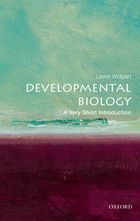Book Review: Developmental Biology, A Very Short Introduction
Posted by Khalil A. Cassimally, on 1 March 2012
Book Info: Developmental Biology: A Very Short Introduction by Lewis Wolpert. Aug 2011. 152 pages. ISBN: 9780199601196 (Paperback) Price: $11.95 /£7.99
 The very first sentence Lewis Wolpert writes in Developmental Biology: A Very Short Introduction communicates the sense of wonder that seeps amongst developmental biologists: “that we develop from a single cell, the fertilized egg, just one tenth of a millimeter in diameter—smaller than full stop—is amazing. That egg has all the information to develop into a human being.”
The very first sentence Lewis Wolpert writes in Developmental Biology: A Very Short Introduction communicates the sense of wonder that seeps amongst developmental biologists: “that we develop from a single cell, the fertilized egg, just one tenth of a millimeter in diameter—smaller than full stop—is amazing. That egg has all the information to develop into a human being.”
And with this sentence begins a marvelous journey into the world of life. Wolpert navigates effortlessly in the complexities of the flowering of life to eloquently synthesise the process of development. From the cell to the embryo to the fetus, Wolpert fabulously explains the process through which life sprouts and develops into a mature organism. Make no mistake though, this book is no popular science. It is very much an academic look into the field of developmental biology.
But what makes this book so different from the developmental biology volumes on library shelves is obviously its size. At 152 pages, it makes up for a quick read and is a good book to carry around if you are new to the field. Major concepts are concisely explained and the illustrations are sometimes all you need to understand what’s going on (I mean what better way to understand the development of genitalia in humans than a diagram).
For an academic book, Developmental Biology: A Very Short Introduction is refreshingly refreshing! Why? Because Wolpert is not only interested in explaining concepts here and there. Instead, he wants to provide readers with an overall and complete view of developmental biology. He wants us to see how the different concepts, mechanisms, processes intertwine with one another to culminate into incredibly sophisticated vertebrates, invertebrates and plants. He explains, synthesises and ultimately frames everything into the bigger picture. Not only is this style exciting and makes for a better read but it also makes for better understanding because Wolpert always tells you where he is going. Wolpert even asks some atypical questions. For example, can an embryo be considered a human? Or is DNA really the blueprint of life?
However the book does not come without its headaches—literally. I got headaches while reading the book for two very different reasons. Firstly, the book does not shy away from jargons (it is after all an academic book) and it’s hard to keep up. Although jargons are dutifully explained, they keep cropping up again and again until eventually my brain became impermeable to them new rather complicated words. Secondly and perhaps more disappointingly: the book has a pungent ammonia smell which gives those old tabloid newspapers a run for their money. Oxford University Press (the publisher) really does a disservice to this wonderful text which is a big shame.
Nonetheless this book remains a must-read for anyone who wants to understand the development of life. Just make sure that you have a couple of aspirins by your side when you read this book.


 (5 votes)
(5 votes)
Thank you for the review, it seems a really interesting book.
I’ve found it in Amazon and I’m going to give it a go. I hope I enjoy it as you did!